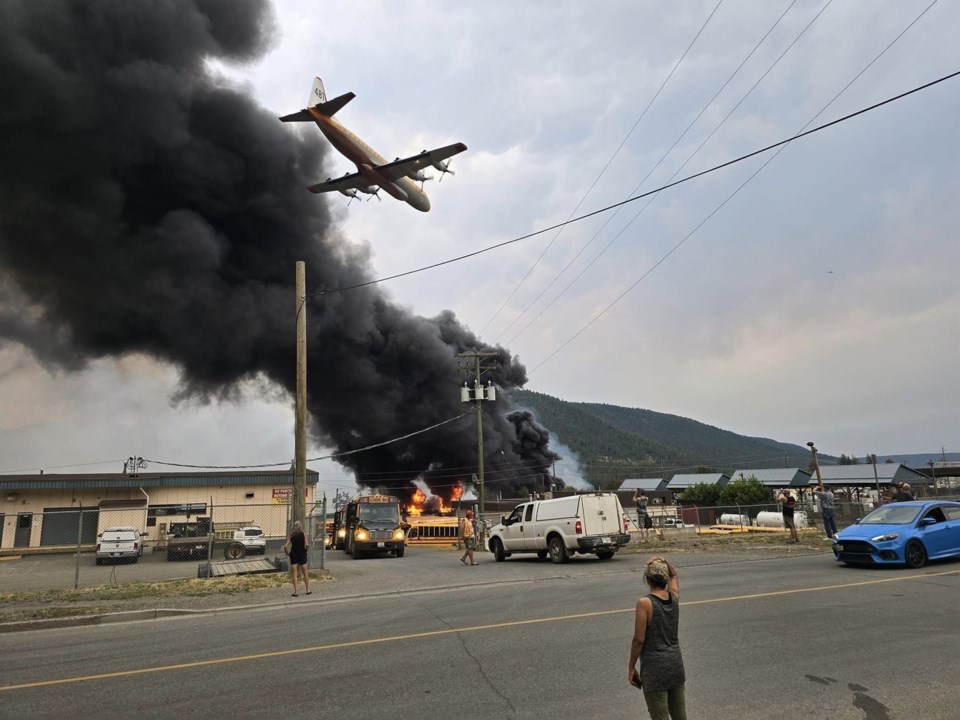Here is a roundup of stories from The 91ԭ�� Press designed to bring you up to speed...
Evacuation ordered for Jasper Park and townsite
Multiple wildfires in Jasper National Park flared up with a vengeance late Monday night, forcing all park visitors along with the 4,700 residents of the Jasper townsite to flee west with little notice over mountain roads through darkness, soot and ash.
Photos and video shared on social media illuminate a midnight cavalcade of bumper-to-bumper cars and trucks, headlights on, red tail lights glowing, cars inching, stopping, starting, crawling through swirling tendrils of acrid smoke.
The Jasper townsite — and the park's main east-west artery Highway 16 — were caught in a fiery pincer. Fires threatening from the northeast cut off highway access east to Edmonton.
Another fire roaring up from the south forced the closure of the north-south Icefields Parkway. That left one route open — west to B.C.
Park and town officials scrambled to clear up traffic gridlock, find fuel for vehicles, help vulnerable people get to safety while also marshalling resources to battle the fires.
Here's what else we're watching...
Storms on the way as B.C. wildfires ramp up
The B.C. Wildfire Service says a significant change in the weather could ramp-up fire activity, as Environment Canada warns of severe thunderstorms in several parts of the province following weeks of hot and dry conditions.
The service says there were thousands of lightning strikes over the weekend in the province's north, and more lightning is on the way for multiple regions, with severe storms potentially bringing gusty winds, hailstones the size of nickels and heavy downpours of rain.
The service says hot and dry conditions persist in the south of the province, with more than 350 fires burning across B.C., four of which are categorized as "wildfires of note."
Environment Canada says heat warnings remain in effect for a number of communities, where daytime temperatures have hovered above 30 degrees, although temperatures are expected to ease over the coming days.
The B.C. Ministry of Transportation says non-essential travel to the Interior is also discouraged as wildfire activity has increased, warning of potential highway closures and delays.
LCBO stores to reopen across Ontario
Hundreds of Ontario's liquor stores will reopen today following a strike that saw their doors close in early July.
About 10,000 Liquor Control Board of Ontario workers returned Monday to prepare for the opening of nearly 700 stores after they walked off the job on July 5.
In addition to reopened retail stores, the LCBO says there will also no longer be limits on online orders, but any online order may take up to three weeks for delivery.
Smaller bars and restaurants began to see dwindled alcohol supplies as the strike stretched on for two weeks.
The Ontario Public Service Employees Union, which represents LCBO workers, had said the labour dispute was largely about Premier Doug Ford's plan to allow convenience and grocery stores to sell ready-to-drink cocktails, saying expanded sales of the beverages would threaten their jobs.
What will make Toronto resilient to flood?
Toronto city councillors, who presided last week over a city of inundated transit stations, roadways and basements, are set to discuss how to make the metropolis more resilient to climate-fuelled floods.
Mayor Olivia Chow's motion, to be tabled at Wednesday's city council meeting, is expected to stir discussion on flood mitigation efforts. The motion, recognizing how climate change has made flood-inducing storms more intense and frequent, asks city staff to look at what discontinued programs could be resuscitated, which ones are already working, and what more can be done.
Experts say Toronto, and most other major cities in Canada, face a tall task.
Across Canada, a once-in-every-50-years rainstorm could come around every 10 years by late century if planet-warming fossil fuels continue to be burned at high levels, according to a 2019 federal assessment.
In Toronto, extreme rainstorms could carry 30 per cent more rainfall by 2080, a recent city report indicated.
Accused to testify in Coutts conspiracy trial
The trial of two men charged with conspiring to murder Mounties at the Coutts border blockade in Alberta is expected to hear more testimony today from one of the accused.
Chris Carbert has told court he brought guns and body armour to the blockade, but says there was no plan for violence unless he had to perhaps flee to the mountains and fend off someone trying to give him a COVID-19 vaccine shot.
Carbert and Anthony Olienick are being tried together in front of a jury in Court of King’s Bench in Lethbridge.
The two were charged after police made arrests and seized weapons at the blockade in early 2022.
The protest against COVID-19 rules and vaccine mandates tied up traffic for two weeks at the Alberta-U.S. border crossing at Coutts.
This report by The 91ԭ�� Press was first published July 23, 2024.
The 91ԭ�� Press



